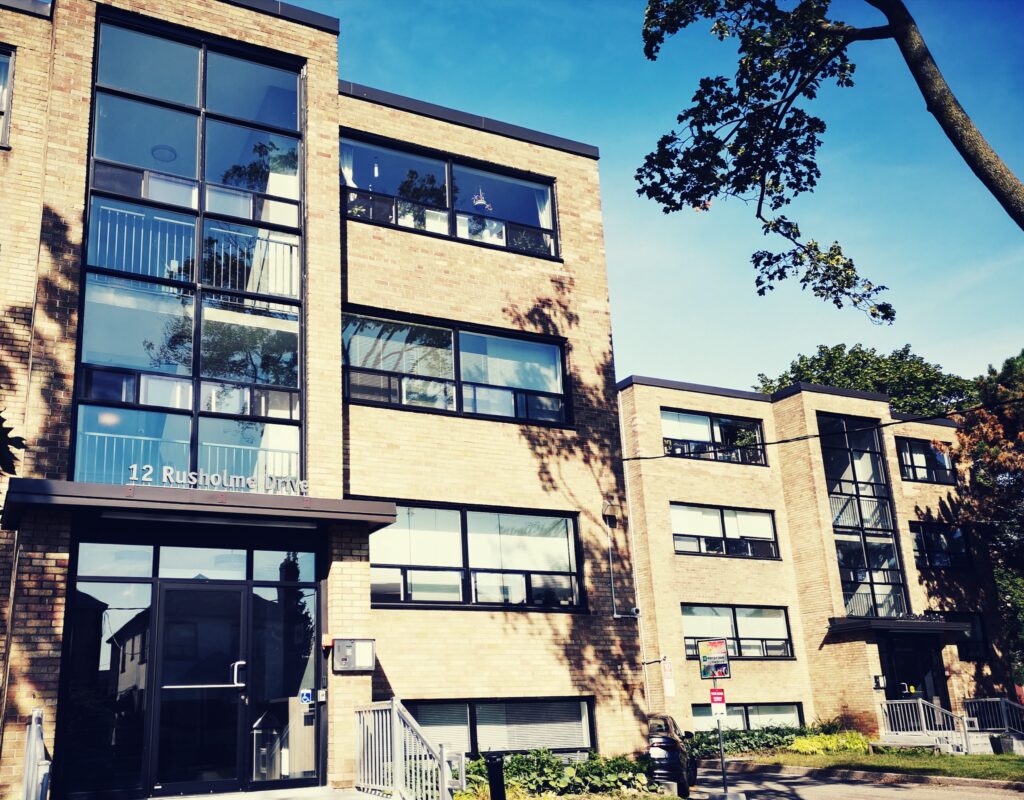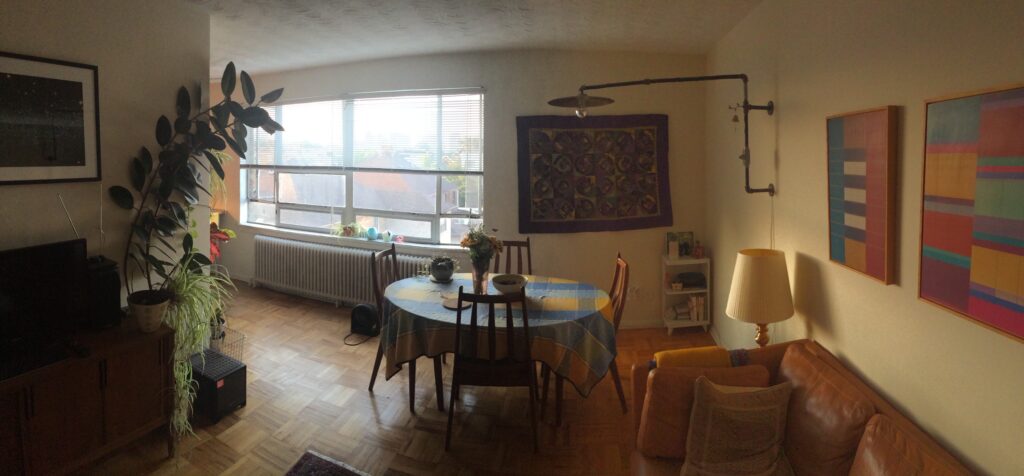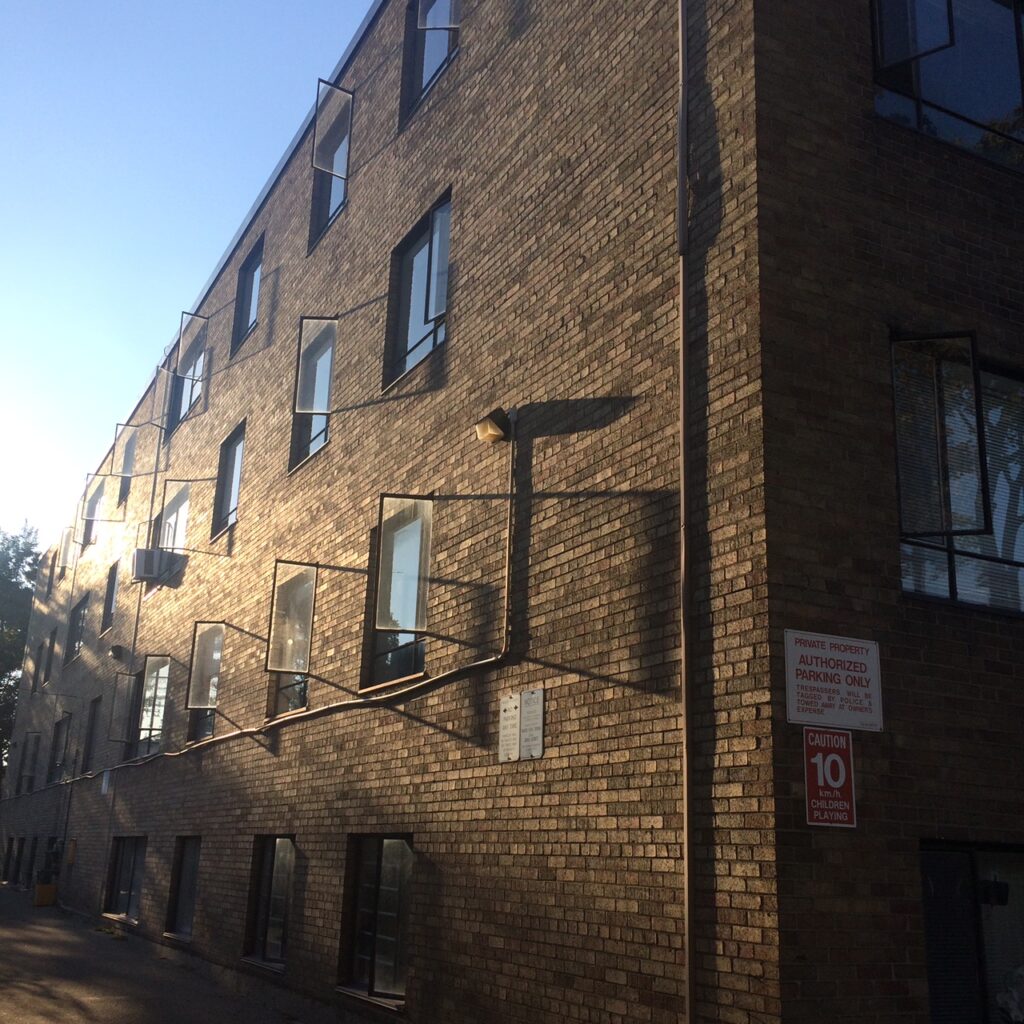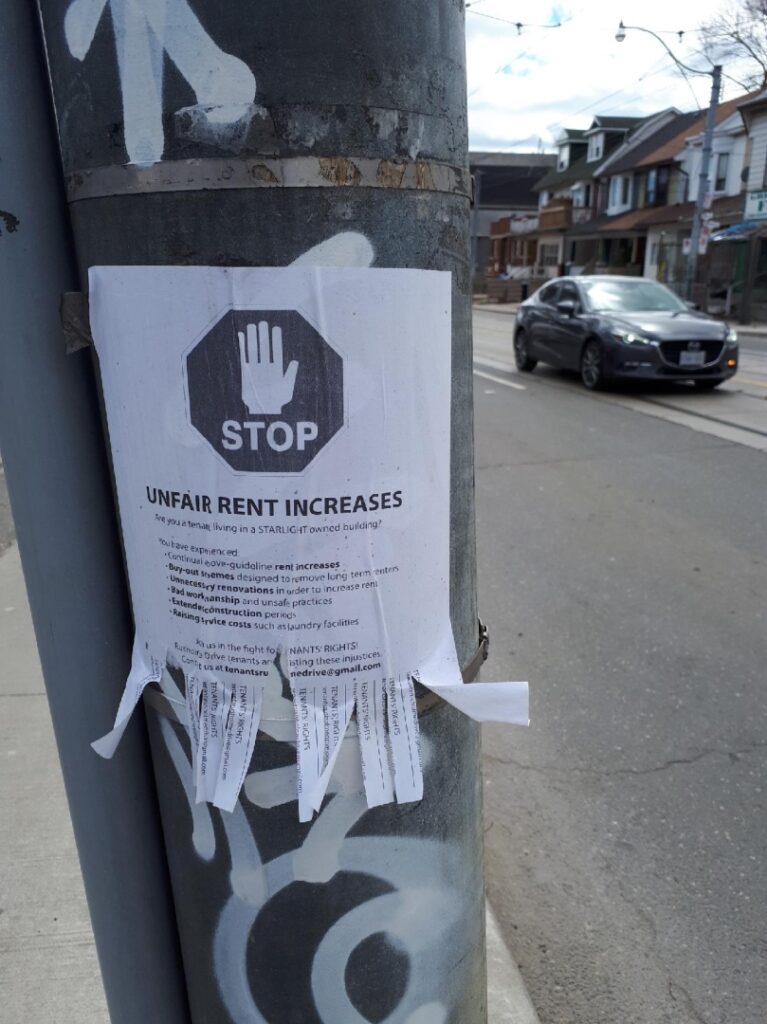PCLS interviews tenant organizers Laura and Reema about how tenants challenged their landlord’s above guideline increase and won. Kevin Laforest, lawyer at Scarborough Community Legal Services, also weighs in.
Don’t wait. As soon as your building is bought by a new owner, or you get that first notice, organize a meeting and start an email list. When the rent increase came through we were prepared because we had organized.
Reema, tenant organizer.

How long have you lived at the building?
Laura: I have lived in this building for 11 years. It was my first apartment on my own and it was a financial stretch for me, although compared to what new renters are paying today it seems very reasonable. I love the neighbourhood.
Reema: I’ve lived here for 10 years. It was the only place I saw at the time that was a good size at a reasonable rent in this neighbourhood.

Why did you get together with your neighbours in the first place?
Reema: I got involved when a neighbour set up a tenant meeting at the building and invited PCLS. It was a good meeting. We were warned about what was to come with the above-guideline increases and encouraged to organize. It was at this meeting that we started the tenant email list, and though we didn’t meet for many months after that, when the above guideline increase (AGI) came, we were prepared.
Laura: What caught my attention was hearing that the buildings were bought by a new owner. Then our old superintendent was let go and maintenance started to go downhill. I received a letter from the new owner, Starlight, asking me to move out of my unit for a cash payment of a few thousand dollars. That was followed by cosmetic updates to the building lobby and halls using lower quality materials than what was there before. Shortly after our first meeting I received a notice of the AGI.

Kevin, can you briefly explain the legal process for AGI’s?
Kevin Laforest: The entire process may take anywhere from six months to one year. When the landlord applies for an AGI, the Landlord and Tenant Board schedules a Case Management Hearing Conference (CMHC). At the CMHC tenants can ask the landlord questions and raise concerns. The landlord is under no obligation to respond. There will also be a Board mediator at the CMHC.
The mediator will try to get either the landlord or the tenants to make an offer to settle. Many tenants I have spoken to have said they felt intimidated by the mediators during the process and felt pressure to settle. There is no obligation to settle. If tenants choose not to settle, there will be a hearing, often in 3-4 months’ time. This is called a merits hearing
At the merits hearing the landlord presents their case. They have to provide evidence to show what work they claimed to have done, and why it qualifies under the law, for the rent increase. Here tenants also have the chance to ask the landlord questions and bring their own evidence.

Why did tenants decide to fight the rent increase?
Laura: Many people in our building are on fixed incomes and most of us don’t have incomes that keep up with these kinds of rent increases. By the third year of increases tenants would be paying between $1200-2000 more in rent. It bothered me that we were going to be charged more to pay for changes that did not benefit us in any way.
Reema: With current rents in Toronto being what they are, moving was not an option for the majority of us, especially for the older and long-term tenants.
What did you do? How did you win?
Laura: We created an email list and we would hold meetings every few months. We were able to get a small grant from the City of Toronto’s Tenant Defense Fund to help with legal expenses related to participating at our hearing at the Landlord and Tenant Board. We hired a lawyer to represent us.
Reema: The night before the first hearing four of us knocked on everyone’s door to encourage as many people as possible to show up to the hearing. There was an amazing turn out and we filled the hearing room. The landlord’s representative presented their case, then our lawyer asked questions. After this everyone except the tenants left the room. Our lawyer came back into the room after a while to let us know that the landlord was prepared to offer a slight reduction in the increase. We were then left to decide whether or not to accept the offer.
We took a vote and the majority declined the landlord’s offer. We were angered by what the landlord’s representative said to try and justify the rent increase. We also felt empowered by our numbers. After we voted down the landlord’s offer we decided on what to do before the next hearing date.
Laura: We decided to reach out to tenants at other Starlight-owned buildings to share information and organize together. We put up flyers at other Starlight buildings around the city. Starlight took them down right away. We may not have reached many other tenants but we caught the landlord’s attention.
A few weeks after our flyering initiative we received a letter from the landlord saying that they would be removing certain expenses from their application and significantly reducing the rent increase. It is quite rare for a landlord to do this, and we think that it is in response to our strong presence and initiative to connect with tenants in other Starlight buildings.

From a lawyer’s perspective, how important is it that tenants are represented?
I have been fortunate enough to work with tenants from a number of buildings in Toronto and the GTA and, in my opinion, the tenants who have been most successful have explored both legal and extra-legal strategies for defending against AGIs.
When I refer to extra-legal strategies, what I mean is tenants harnessing the power of collective action. Tenants first and foremost need to organize among themselves. It starts with door knocking and introductions; then maintenance request drives, demonstrations at landlord’s head offices, and media campaigns aimed at shedding light on the real cost of AGI’s – the displacement of working class people from their homes and neighborhoods.
In my experience, extra-legal strategies have proven to be the most effective way to defend against AGIs and to make clear to landlords that working class people will not stand idly by as their friends, families and neighbours are displaced. Organizing also builds friendships and a real sense of community.
Legal representation can be essential to making sure tenants have enough time to apply these strategies. Depending on the size of the building and the number of units involved, this may mean months as opposed to weeks.
Last word to the tenants. What advice do you have for other tenants who want to organize?
Laura: Keep in touch with each other through an email list and meetings – some people may prefer to meet in person, others may just want updates over email. Share information! Hold meetings before key hearings. Come to a consensus about how to respond to possible outcomes. Consider how to reach out to other tenants in your area.
Reema: Don’t wait. As soon as your building is bought by a new owner, or you get that first notice, organize a meeting and start an email list. When the rent increase came through we were prepared because we had organized.
For more information contact Cole Webber, Parkdale Community Legal Services, webberc@lao.on.ca or 416-531-2411, ext. 248.
